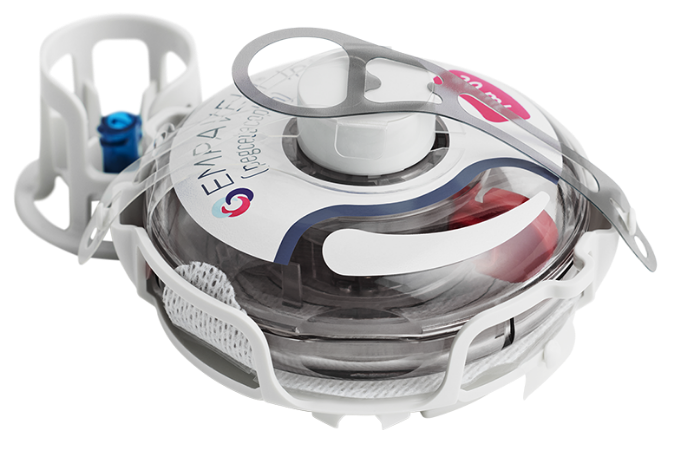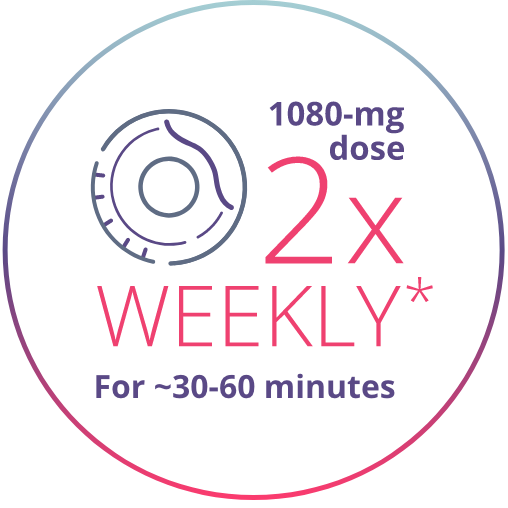EMPAVELI is a medicine that affects your immune system and may lower the ability of your immune system to fight infections.
EMPAVELI increases your chance of getting serious infections caused by encapsulated bacteria such as Streptococcus pneumoniae, Neisseria meningitidis, and Haemophilus influenzae type B. These serious infections may quickly become life-threatening or cause death if not recognized and treated early.
Your healthcare provider will give you a Patient Safety Card about the risk of serious infections. Carry it with you at all times during treatment and for 2 months after your last EMPAVELI dose. Your risk of serious infections may continue for several weeks after your last dose of EMPAVELI. It is important to show this card to any healthcare provider who treats you. This will help them diagnose and treat you quickly.
EMPAVELI is only available through a program called the EMPAVELI Risk Evaluation and Mitigation Strategy (REMS). Before you can take EMPAVELI, your healthcare provider must enroll in the EMPAVELI REMS program, counsel you about the risk of serious infections caused by certain bacteria, give you information about the symptoms of serious infections, make sure that you are vaccinated against serious infections caused by encapsulated bacteria and that you receive antibiotics if you need to start EMPAVELI right away and you are not up to date on your vaccines, and give you a Patient Safety Card about your risk of serious infections.
Do not take EMPAVELI if you:
Before you take EMPAVELI, tell your healthcare provider about all of your medical conditions, including if you:
Tell your healthcare provider about all the vaccines you receive and medicines you take, including prescription and over-the-counter medicines, vitamins, and herbal supplements which could affect your treatment.
If you stop taking EMPAVELI, your healthcare provider will need to monitor you closely for at least 8 weeks after stopping EMPAVELI. Stopping treatment with EMPAVELI may cause a breakdown of red blood cells due to PNH.
Symptoms or problems that can happen due to red blood cell breakdown include:
EMPAVELI can cause serious side effects including allergic reactions. Allergic reactions can happen during your EMPAVELI infusion. Stop your EMPAVELI infusion and tell your healthcare provider or get emergency medical care right away if you get any of these symptoms during your EMPAVELI infusion:
The most common side effects in people with PNH treated with EMPAVELI include injection-site reactions; infections; diarrhea; pain in the stomach (abdomen); respiratory tract infection; pain in the arms, hands, legs, or feet; low potassium in blood; tiredness; viral infection; cough; joint pain; dizziness; headache; and rash.
These are not all of the possible side effects of EMPAVELI. Tell your healthcare provider about any side effect that bothers you or that does not go away.
Call your healthcare provider for medical advice about side effects. You may report side effects to FDA at 1-800-FDA-1088 or www.fda.gov/medwatch.
EMPAVELI is a prescription medicine used to treat adults with a disease called paroxysmal nocturnal hemoglobinuria (PNH).
Please see full Prescribing Information, including Boxed WARNING regarding risk of serious infections, and Medication Guide for additional information.
EMPAVELI is a paroxysmal nocturnal hemoglobinuria (PNH) treatment that you give yourself at home or wherever works for you (after receiving proper training). Self-administering EMPAVELI should take approximately 30 to 60 minutes.
EMPAVELI is self-administered subcutaneously (just under the skin) with the EMPAVELI Injector or a commercially available infusion pump with a reservoir of at least 20 mL. With EMPAVELI self-administration, there’s no need to plan days or vacations around infusion center visits.

About the EMPAVELI Injector
When cooking? When spending time in the yard? Share your self-administration experience with the EMPAVELI Injector.
EMPAVELI is self-administered just under the skin using a small, thin needle that you never see with the EMPAVELI Injector.
EMPAVELI is not an IV infusion (into the vein) that requires a healthcare provider to administer it for you.
1-on-1 self-administration training
Your healthcare provider will first show you how to self-administer your EMPAVELI.
At Apellis, we understand each person’s journey with PNH and EMPAVELI is different. With that in mind, we have designed our support services and self-administration training to fit comprehensive patient needs.
With the ApellisAssist® patient support program, you will have the help of an Apellis Care Educator (ACE). ACEs have nursing backgrounds and will provide you with self-administration training. Your ACE can train you in your home or virtually—multiple times, if necessary—to make sure you’re comfortable with the process.
They will continue to be by your side throughout your journey with ongoing support, education, and answers to your questions.
ACEs do not give medical advice. Talk to your doctor for treatment-related questions.

Transitioning to EMPAVELI from a C5i treatment
Your healthcare provider will work with you to transition you to EMPAVELI.
Eculizumab
Ravulizumab
Required vaccines
Before starting your treatment journey with EMPAVELI, you will need to get certain vaccines. They help reduce the risk of certain serious infections.
You will be required to receive vaccinations against certain types of bacteria at least 2 weeks before taking your first dose of EMPAVELI.
As part of the ApellisAssist program, a Vaccine Coordinator through our specialty pharmacy, PANTHERx® Rare, can help you with this process
Your Vaccine Coordinator can help make sure you get the required vaccines by:
When visiting your healthcare provider:
Reach out to your healthcare provider if you have any additional questions about starting EMPAVELI.

How often do I take EMPAVELI?
*If there is an increase in your lactate dehydrogenase (LDH), an enzyme in your blood, your healthcare provider may tell you to take EMPAVELI every 3 days.
Self-administering EMPAVELI using an infusion pump?
See these specific Instructions for Use if you were provided and trained with an infusion pump.
Watch the video for EMPAVELI self-administration with a pump

“I love to travel. With EMPAVELI self-administration, I can bring my supplies with me and travel without interrupting my treatment schedule.”
Emma is an adult with PNH who's taken EMPAVELI.
Individual experiences may vary.
When traveling, ensure that EMPAVELI stays at 36°F to 46°F (2°C-8°C).
EMPAVELI is a medicine that affects your immune system and may lower the ability of your immune system to fight infections.
EMPAVELI increases your chance of getting serious infections caused by encapsulated bacteria such as Streptococcus pneumoniae, Neisseria meningitidis, and Haemophilus influenzae type B. These serious infections may quickly become life-threatening or cause death if not recognized and treated early.
Your healthcare provider will give you a Patient Safety Card about the risk of serious infections. Carry it with you at all times during treatment and for 2 months after your last EMPAVELI dose. Your risk of serious infections may continue for several weeks after your last dose of EMPAVELI. It is important to show this card to any healthcare provider who treats you. This will help them diagnose and treat you quickly.
EMPAVELI is only available through a program called the EMPAVELI Risk Evaluation and Mitigation Strategy (REMS). Before you can take EMPAVELI, your healthcare provider must enroll in the EMPAVELI REMS program, counsel you about the risk of serious infections caused by certain bacteria, give you information about the symptoms of serious infections, make sure that you are vaccinated against serious infections caused by encapsulated bacteria and that you receive antibiotics if you need to start EMPAVELI right away and you are not up to date on your vaccines, and give you a Patient Safety Card about your risk of serious infections.
Do not take EMPAVELI if you:
Before you take EMPAVELI, tell your healthcare provider about all of your medical conditions, including if you:
Tell your healthcare provider about all the vaccines you receive and medicines you take, including prescription and over-the-counter medicines, vitamins, and herbal supplements which could affect your treatment.
If you stop taking EMPAVELI, your healthcare provider will need to monitor you closely for at least 8 weeks after stopping EMPAVELI. Stopping treatment with EMPAVELI may cause a breakdown of red blood cells due to PNH.
Symptoms or problems that can happen due to red blood cell breakdown include:
EMPAVELI can cause serious side effects including allergic reactions. Allergic reactions can happen during your EMPAVELI infusion. Stop your EMPAVELI infusion and tell your healthcare provider or get emergency medical care right away if you get any of these symptoms during your EMPAVELI infusion:
The most common side effects in people with PNH treated with EMPAVELI include injection-site reactions; infections; diarrhea; pain in the stomach (abdomen); respiratory tract infection; pain in the arms, hands, legs, or feet; low potassium in blood; tiredness; viral infection; cough; joint pain; dizziness; headache; and rash.
These are not all of the possible side effects of EMPAVELI. Tell your healthcare provider about any side effect that bothers you or that does not go away.
Call your healthcare provider for medical advice about side effects. You may report side effects to FDA at 1-800-FDA-1088 or www.fda.gov/medwatch.
EMPAVELI is a prescription medicine used to treat adults with a disease called paroxysmal nocturnal hemoglobinuria (PNH).
Please see full Prescribing Information, including Boxed WARNING regarding risk of serious infections, and Medication Guide for additional information.
Get the latest news on EMPAVELI sign up now

The information on this website is intended for US healthcare providers.
By submitting this form, I acknowledge that I have reviewed, understood, and agree to the below guidelines, that I am at least 18 years of age and am legally competent to enter into this agreement, that I own all rights to the content submitted, and that I have received permission to submit the content from any other individual appearing in my submission for use by Apellis Pharmaceuticals, Inc. (“Apellis”), as set forth below.
Apellis can take, collect and use any content I have submitted to this webpage, including my photographs, film or recordings taken of my image and voice, my quotation or testimonial, as well as any personal health information contained in such photographs, film or recordings or provided on this submission form (collectively, “My Content and Information”). Apellis reserves the right to not post or use My Content and Information.
Apellis and its subsidiaries, affiliates, licensees, successors, assignees and those acting with its authority, have the right to use, re-use, broadcast, display and publish My Content and Information on social media, websites, displays, and emails. I waive all rights that I may have to claims for payment or royalties in connection with the posting or other usage of My Content and Information on these platforms. Apellis will contact me by e-mail or phone if it would like to feature My Content and Information elsewhere.
Any content that I submit to Apellis may be edited or excerpted in Apellis’ sole discretion to align with promotional requirements and the intended use of this site. I waive all rights in My Content and Information, including any right to inspect or approve My Content and Information prior to use or dissemination by Apellis. If significant changes are required, Apellis may contact me via e-mail or phone. Apellis will not use my e-mail address or phone number for any other purpose, unless I have separately opted into receiving communications from Apellis.
Adverse Events (“AEs”): Apellis will address any adverse events or side effects mentioned within submissions according to FDA regulations.
You may report side effects to FDA at 1-800-FDA-1088 or www.fda.gov/medwatch.